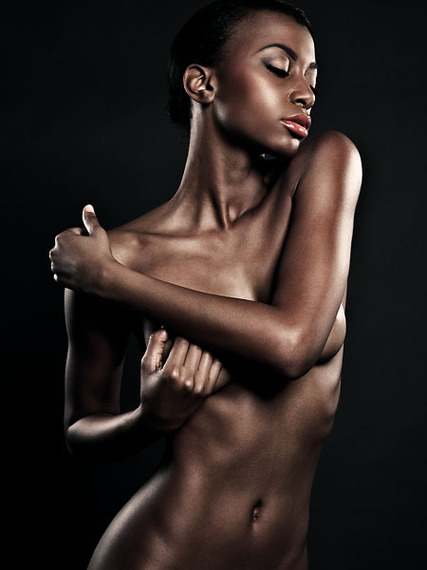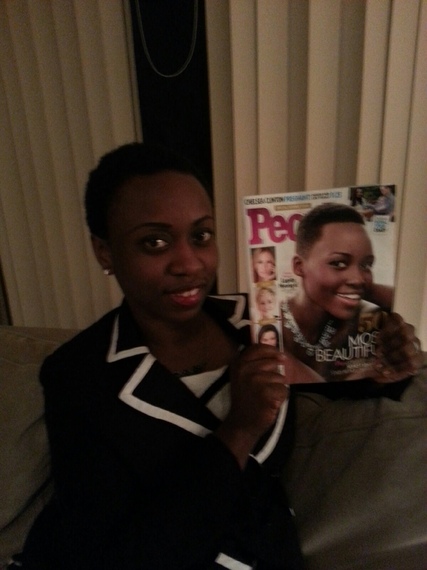
In September of 2013, Julie Chen, a co-host of The Talk, revealed that she had undergone plastic surgery two decades earlier in order to enlarge her "Asian eyes." A big-time agent told her in plain English that he would not represent her unless she received plastic surgery to make her eyes bigger. This agent echoed the sentiments of her news director who told her that her "Asian eyes" made her unrelatable to mainstream audiences. Ms. Chen decided to have the surgery done despite the surgical risks, the year-long recovery and the threat that some relatives would disown her. Although Ms. Chen says that she has no regrets (her career did take off after the surgery), she wonders if she "gave in to the man."
Yes, in my view, she "gave in to the man." At least two literal and proverbial white men told her that she did not look good enough and or that she had to have surgery to look more white and she did just that. This is a textbook example of giving in to the man. Does her decision make her a bad person? No. In the past, I have "given into the man" through the use of relaxers, weaves and skin lighteners, and I don't think that I'm a bad person. Does it make her unworthy of her success? No. She has worked hard.
While it is true that the entertainment industry is brutal for people of all races, Kelly Barrett, a 36-year-old white actress who is filming on the CW's The 100 this summer, expresses the constant pressure to "look good" and her constant anxiety surrounding her skin, hair and body. As she ages, she says that the temptation to use Botox also increases. But women of color face these general pressures in addition to the specific pressure to dilute the God-given features that uniquely mark them as being Asian or African descendants. And although there is a wide variety of features with respect to skin tone, hair texture, and eye shape within these groups, the vestiges of slavery and colonialism have made features that bear more of a similarity to those found in Europe more valued in the global entertainment industry.
Vel Jones, an African-American actress and model, can attests to this fact. She says that as far as she can tell, actresses of African descent are the only women in the entertainment industry who are routinely asked if they have an arsenal of wigs to pull from because their natural hair is deemed unacceptable. When she decided to wear her hair afro-textured hair in a low-cut and give up the wigs, she was told that her look was too "edgy" for commercial work and she has seen the impact with respect to her earnings.
The internal and external pressure to look "more white" through make-up, surgery, skin-lightening treatments, relaxers, weaves and/or wigs can be seen in the drastic transformations of South African pop singer Mshoza and Somali model Iman.
But the recent selection of Lupita Nyong'o as "Most Beautiful" by People magazine gives me a certain degree of optimism that change is on the horizon. Lupita Nyong'o looks very different from fellow "most beautifuls," such as Gwyneth Paltrow, Beyonce Knowles, Jennifer Lopez, Julia Roberts, Drew Barrymore, Halle Berry and Angelina Jolie. It seems as if in almost every way Lupita Nyong'o defies the traditional Hollywood standard of beauty. She shows us that beauty has no formulas. We can imagine that some people have suggested that she bleach her skin, put a weave in her hair, get a nose job and or augment her breasts. Yet as far as we know, she has succumbed to no one and nothing. She remains black, beautiful and brilliant without any hint of an apology. Lupita Nyong'o embodies the lesson of my inspirational children's book, Sunne's Gift: There is beauty and power in difference.
To me, she represents a transformational figure who enlarges our vision of what is possible such as Oprah Winfrey and President Barack Obama. There is always skepticism at the brink of transformation. Both Oprah Winfrey and President Obama were the targets of naysayers. People thought that the Oprah show would not last. One of my best friends told me that it would be a cold day in hell before a black man named Barack Obama becomes the president of the United States.
Similarly, when I posted this celebratory photo of myself and Lupita on Facebook with the caption "I feel like I won," one of my Facebook friends accused me of seeking white validation and then proceeded to imply that Lupita's win was just charity and that if her career continues she will only get roles as maids and slaves.
I see more for Lupita Nyong'o. Her diverse fanbase and her proven marketability reveal much more. Her career trajectory shows us a case in which a woman of color did not have to "give in to the man" to get ahead. Her success shows that people who look vastly different from her are able to relate to her.
This last point is crucial. We live in a media environment in which both the victories and tragedies experienced by women of color in the United States and abroad are often ignored by mainstream media because those in power falsely believe that the mainstream would never relate. Would the Nigerian girls kidnapped by Boko Haram or the Indonesian woman who may be caned publicly after being gang-raped receive more immediate attention if those victims bleached their skin, added weaves their hair, received nose jobs and other surgeries to make them more relatable?
Although I am vocal about the inspiration that I receive by seeing women who look like me on screen, I never stopped enjoying movies with non-black protagonists due to a failure to relate to those characters. They are human and I am human, therefore we can relate.
The success of Lupita Nyong'o and other unapologetic actors who refuse to apologize for their "ethnic" features is crucial because as the mainstream relates to them on-screen they will also begin to relate to the real life dramas of people of color that unfold off-screen. More empathy for each is other is exactly what we need to effect change. Change does not happen overnight -- but it can happen. In short, power to all the actors and actresses out there who refuse to "give in to the man."

